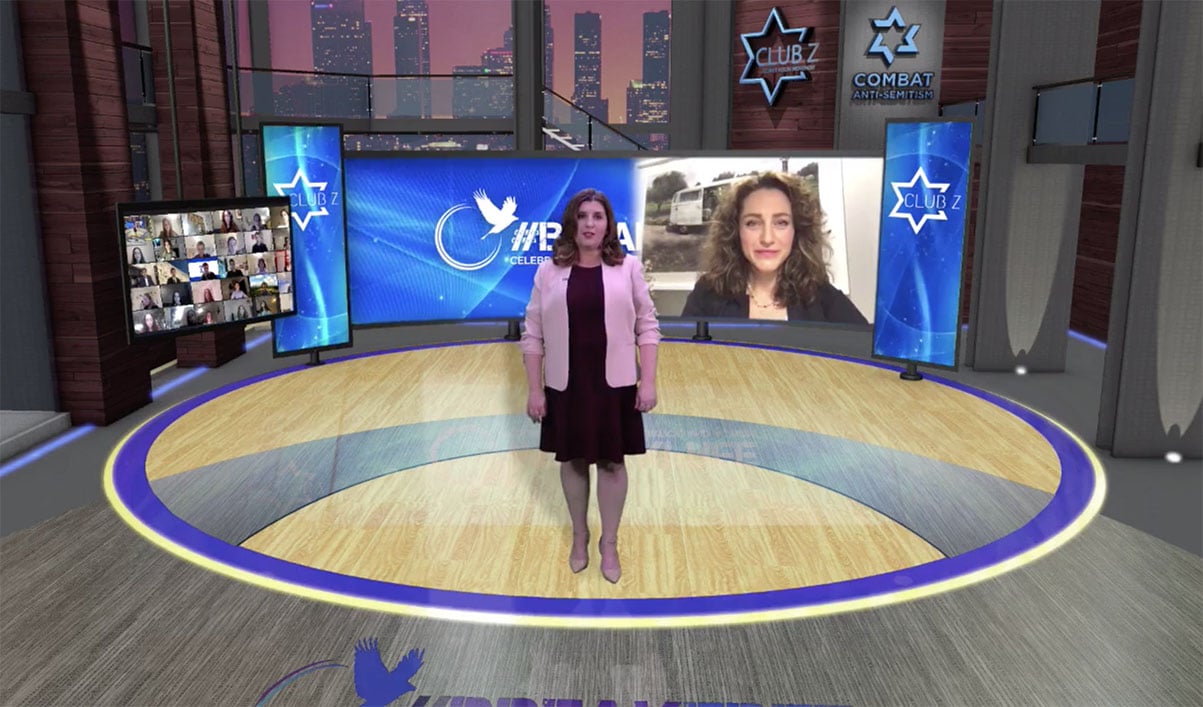 Masha Merkulova, Founder and Executive Director of Club Z introduces Brooke Goldstein during Club Z’s virtual summit. (screenshot)
Masha Merkulova, Founder and Executive Director of Club Z introduces Brooke Goldstein during Club Z’s virtual summit. (screenshot) Brooke Goldstein, executive director of The Lawfare Project and founding partner of the grassroots organization End Jew Hatred, called for Zionist activists to change the narrative during Club Z’s virtual summit.
Club Z, which calls itself a “Zionism for Teens” organization, held a summit on January 24 called “#BreakFree Celebrating Zionism, Justice and Activism.” Goldstein, who was the keynote speaker, noted that the past year has seen “the rise of minority rights movements in the West and creating seismic shifts and changes with how the public views minorities,” citing the Black Lives Matter and LGBTQ+ movements as examples. However, “Jews and the Jewish community still have not mobilized themselves to achieve this type of effective change and the question is why.”
She argued that this inertia is because the Jewish community frames the discussion of Zionism around a “pro-Israel narrative.” Goldstein called this a “strategic mistake,” because such discussions turn into a Middle East debate, thereby legitimizing the other side, which is the anti-Israel Boycott, Divestment and Sanctions (BDS) Movement.
Instead, Goldstein suggested that Zionist activists need to frame the issue as a matter of opposing bigotry. She pointed to Jewish students on college campuses constantly subjected to a litmus test over the Israeli government’s actions, which she said would be like asking a Muslim student to condemn the Iranian government in order to be included in spaces on college campuses.
Goldstein suggested that Zionist activists need to frame the issue as a matter of opposing bigotry.
The importance of Club Z, Goldstein said, is that it “recenters what it means to be a Jewish advocate as a proud minority in this country deserving of equal protection under the law.”
The summit then turned to a campus activist panel. The first speaker on the panel, former New York University (NYU) student Adela Cojab, spoke about how she filed a complaint against the university after an award was given to the NYU Students for Justice in Palestine (SJP) chapter.
Cojab said that prior to filing the complaint, she had spoken to university administrators multiple times about issues pro-Israel students had with SJP; this included SJP members allegedly assaulting a pro-Israel student and burning an Israeli flag during a Yom Ha’atzmaut rally. Cojab said she was initially “petrified” about suing the school and starting a scandal, but is now “proud of what I did” since she “was able to change things for college students across the country.”
The panel also featured Julia Jassey, who spoke about co-founding the Instagram account known as “Jewish on Campus.” She said that the account was necessary for Jewish students to voice they’ve been “being targeted and left out of classroom conversations” due to their Zionist activism. “There’s no one face to Zionism there’s no one fac[e] to Judaism… but we’re tied together by this common thread,” she said.
Joshua Washington, director of the Institute for Black Solidarity with Israel (IBSI), also spoke on the panel, explaining that Zionists tend to defend Israel by pointing out how the Jewish state has hospitals in the Gaza Strip and on the border with Syria to treat civilians. However, the anti-Israel crowd tries to invalidate such arguments by claiming that Israel was built on stolen land, Washington said. He added that it’s important to “stand firmly on the truth” that “Jews are indigenous to the land.”
Washington also said that he has made a lot of enemies for speaking out against Black Lives Matter’s “anti-Israel agenda,” but argued that he was only criticizing what’s been said in their platform and in their leaders’ speeches. “[I] don’t like seeing my community being used for Jew-hatred,” he said.
The summit concluded with a panel from high school students explaining the importance of Zionism.






















 More news and opinions than at a Shabbat dinner, right in your inbox.
More news and opinions than at a Shabbat dinner, right in your inbox.